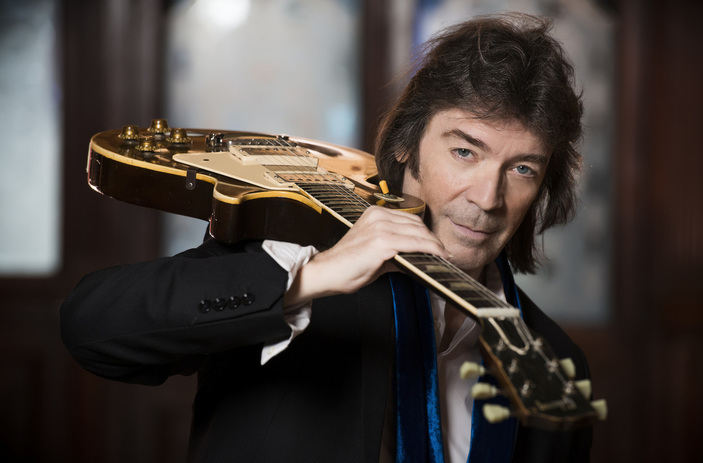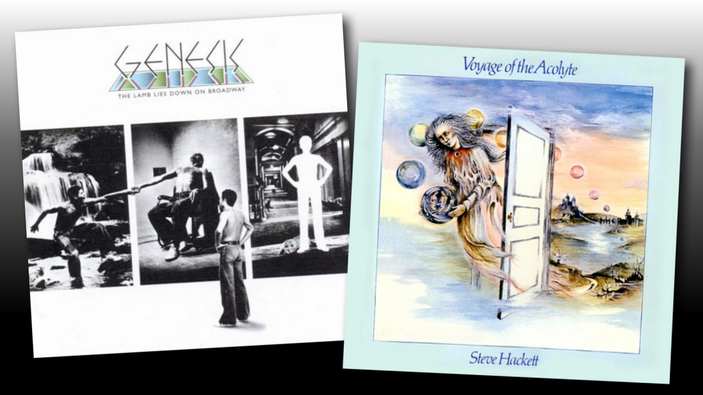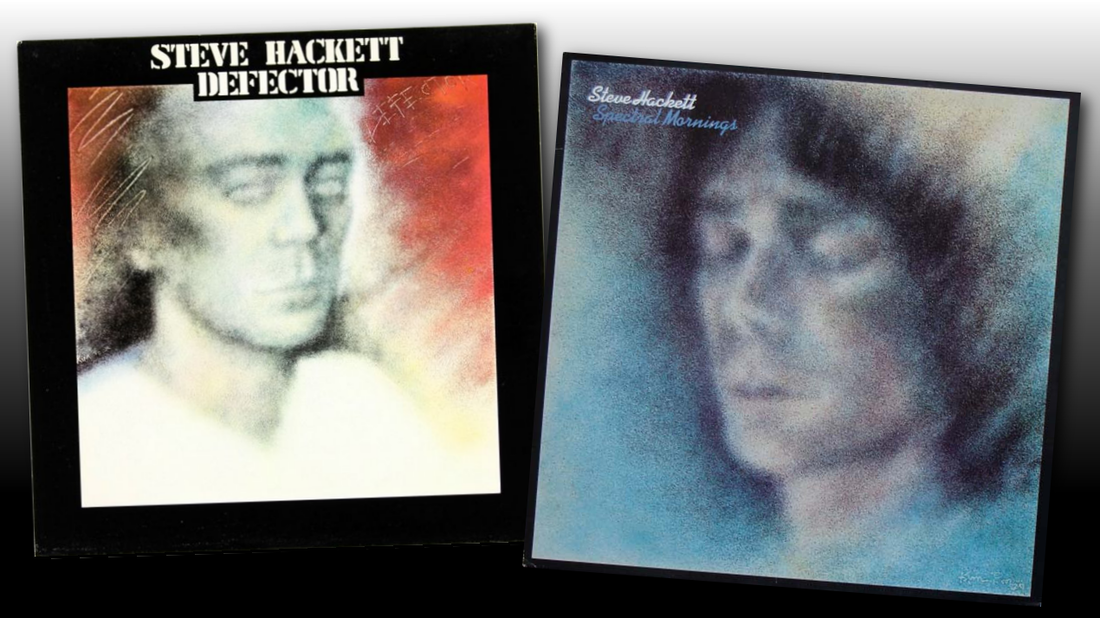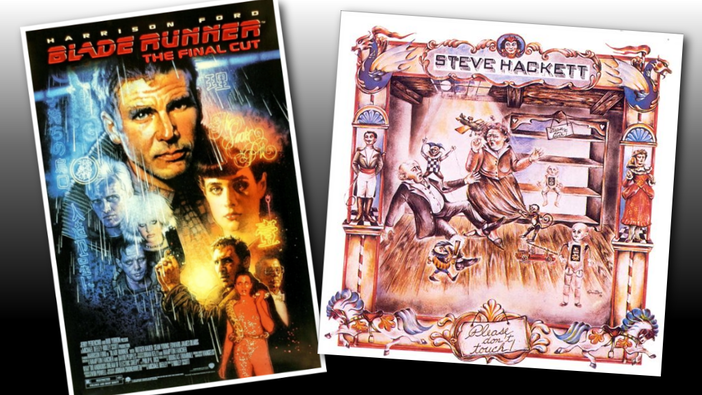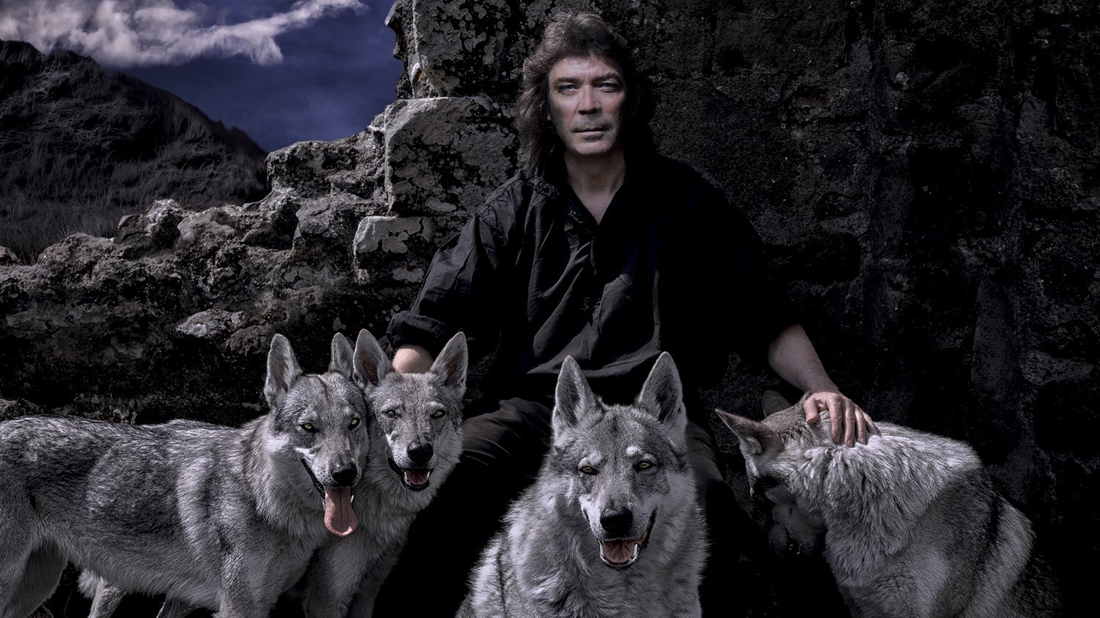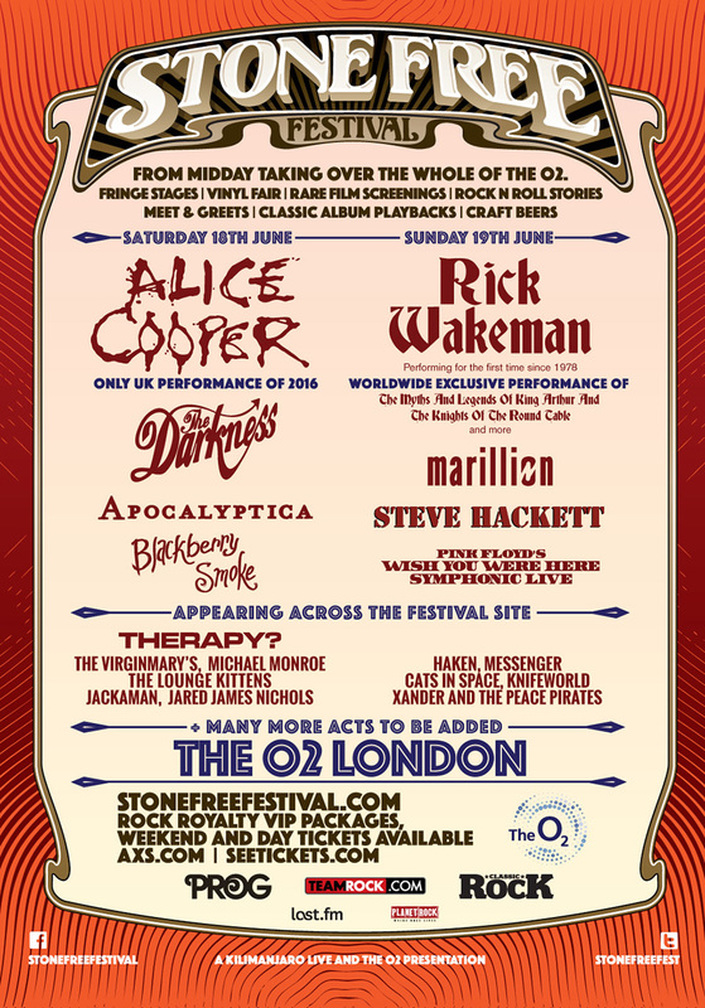|
Fresh from another successful bout of touring, the ever amiable Steve Hackett is preparing to delve back into his past, with the re-release of deluxe editions of his late 1970s’ ‘Charisma Years’ albums; 'Please Don't Touch', 'Spectral Mornings' and 'Defector'. Remixed by Steve Wilson and featuring a wealth of bonus material, they sound, says the former Genesis guitarist; “absolutely wonderful, like it was all meant to be”. We caught up with Steve to chat about the early days of his solo career, and find out what it was like stepping away from his former band.
Hi Steve, How are you today?
It is I! I am very good today. It’s nice and sunny and it’s a lovely day in fact. I’m stuck inside though as I’ve been practicing because I’m recording something tomorrow that’s horrendously difficult to play. I’m a bit of a volunteer for a bit of self-torture. Steve Hackett saying that something is “horrendously difficult to play”, must mean that it must be pretty daunting! Well, yeah, it is. I’m recording one of those things on the nylon guitar; it’s a tremolando piece, so you’re trilling on the top strings and you’re picking out the bass on the bottom, and it’s very difficult to get it even. Even [composer] John Williams says that it’s very difficult to get it even - he should know, and he’s not wrong! I’ve been practicing this technique for years and years and years, and I still think that it’s the most difficult technique of all of them. You’re about to reissue your early ‘Charisma Years’ albums. That’s right, yeah. They came out on CD in a big box set with live stuff, but now they’re dividing it up, so there’s five or six albums on vinyl, and then there’s three boxes of two CD sets that they’re doing. I’m signing a whole bunch of those on Wednesday. It must stir up a lot of nostalgic feelings looking back. Yeah it does. Music really is nostalgia, isn’t it? Once it’s been out there for a while, very quickly you tend to remember the circumstances of recording. I remember doing the first one with ‘[Voage Of The] Acolyte’, and recording at Aviation House, Kingsway, in London, that was owned, I think at the time by Deep Purple. Because it was a government building that happened to have this recording studio in the basement, the noise restriction was such that you couldn’t record until six o’clock at night! So those sessions were all from six ‘til early doors; from six ‘til three, from six ‘til four’ so it’s strange – there’s something of the night about that album. So do you think working those nocturnal hours influenced the sound of the album? I think it did, yeah; the lack of daylight and the total subscription to the timeless void. But I think when you’re enjoying yourself you don’t notice; the colours are all very bright in the imagination when you hear something coming back and it’s sounding good. In those early days the recording process could be quite hit and miss, and I’d often write a tune and I’d think; “I wonder if this will sound as good as it does in my imagination”, and sometimes it did, but sometimes it didn’t. But it’s all part of it. Now of course you can do things on computer and you can fix tuning and you can fix timing, but what you can’t do; you can’t fix passion, of course. ‘Voyage Of The Acolyte’ was recorded shortly after Genesis’ ‘The Lamb Lies Down On Broadway’ tour had finished - just two weeks later I’ve read.
Let me see… Do you know, that is possible. You might be right, and yet of course, I was completely wiped out doing ‘The Lamb Lies Down On Broadway’, because it was practically nine months on the road, straight. When you do nine months on the road, coughs and colds don’t go away. But it certainly sounds good. Once I was in the studio I was feeling fresh; these were fresh ideas, I was working with pals – some classical musicians, many rock musicians, Sally Oldfield – sister of Mike, and it was just wonderful. The first time in the studio, and it’s all for ‘me’. Both your at the time, Genesis colleagues Phil Collins and Mike Rutherford appear. Some fans have called it the ‘lost Genesis’ album. What are your thoughts? Yes, ‘And then there were three’! There were three Genesis members that were all working on something that I’d come up with. It felt very nice to work outside the pressure of being a group, and to explore things in a different way - for instance using a click track for the first time with Phil. It was a lot of fun; he was doing a lot of percussion and he sang some vocals on it. He’s also a great percussionist; he’s very inventive, and also playing vibes. He’s really very fluent at this sort of stuff. You must have felt a certain amount of pressure; as you said it was all coming out under your own umbrella, rather than a group. Yes, I didn’t know if it was going to fly or not; I thought I might come out with a bunch of outtakes - a cutting-room floor job. But actually the very first night was we tracked ‘Hand Of The Priestess’. I borrowed Mike [Rutherford]’s twelve-string, and I was playing mellotron myself, and my brother [John Hackett] was playing flute professionally for the first time, and it was a stellar performance from him. The remixing that Steve Wilson has done for the re-issues must make you see things in a new light. It all got remixed for the reissues, and it sounds extraordinary again. Steve Wilson did an amazing job with software, because we only had the master tapes for two of those albums; ‘Please Don’t Touch’ - which is Wilson’s favourite - and ‘Spectral Mornings’, and he did a great job on those. With ‘Acolyte’ and with ‘Defector’, he created the surround sound from the stereo mixes. But you know what? It sounds absolutely wonderful, and it sounds like it was all meant to be like that. I mean, I don’t know how the technology works, but some things are in the rear, some things are in the front. It’s a great ride. I would imagine with such a body of work that you’d be critical of it.
Well with many things I would be critical of; like, oh, we’ve done that live now, so we do that at a better speed. But I think that with anything from the past, there’s always going to be that feeling that, with today’s technology if you started from scratch you could probably make it sound better. I don’t know about you, but I’m not sure that I really want to hear ‘Sgt. Pepper’ completely in time, and in tune, and all quantised up and what have you. I think there’s something to be said for the ‘looseness’ and the organic way that these things were recorded. I can’t think of another word other than ‘organic’, because it ‘grew’ like that, and that’s what musicians used to do; they all used to get in there in a room together. Now of course you’ve got the choice of whether you want to do it that way, or have the ‘test tube baby’ approach; in vitro fertilised albums. Your second album ‘Please Don’t Touch’ was released when you were no longer a member of Genesis. It was a much more difficult time. There wasn’t really a regular band; there was Chester Thompson on drums, Tom Fowler on bass, and I was working again with my brother John, and also [keyboardist] John Acock, who has now passed on - a very sweet guy; we did many of those early albums together. So we had that core, almost like a band unit, but then we were working with different rhythm sections, and different singers like Richie Havens, which was extraordinary, and Steve Walsh of Kansas; that was extraordinary, and Randy Crawford before she’d done anything really in this country. It was wonderful to work with such extraordinary singers. That was quite an eclectic mix, wasn’t it? Yes it was. It was a bit like a personal sampler album, that one. I was trying to make all the songs sound very different; different genres, different bands, and my reasoning was that I liked the late 60s’ CBS sampler albums where you had Leonard Cohen next to The Grateful Dead, next to Time Rose, next to Simon And Garfunkel, and so on, all on the same album. It made for a very interesting mix of things. The music never sat still and I thought; I wonder if a certain individual - i.e. ‘me’, could do that and be as eclectic and show all of your roots from the rock stuff to the pop stuff to the fusion stuff, the classical stuff – all of those influences on one album? So I did, and I remember Tony Stratton-Smith, the label boss at Charisma at the time said that its diversity was both its strength and its weakness. Perhaps you sacrifice that identity along the water of diversity, but hey, I’ve done an awful lot of albums since then. Didn’t the cover art to ‘Please Don’t Touch’ inspire a scene from Blade Runner? Yeah, well they were making that nearby, and one of the guys that was editing that saw that and showed it to [director] Ridley Scott at the time, so it seems that there was some influence. It’s a pitty I never did the score for the movie! *laughing* That would have been good, but that went to another man; that went to Vangelis of course who did a very good job on that. Moving on to the present and you have a new live DVD coming out too. ‘The Total Experience Live In Liverpool’.
Yes, from Liverpool; ‘live in Liverpool’! It’s a very good set. It’s very diverse; there’s the solo stuff, there’s Genesis stuff, there’s early stuff, there’s late stuff, and it’s almost three hours long. It’s a very long show. I’m off to Japan on Thursday doing that. It’s quite a mix. It covers a wide spectrum; from ‘Acolyte’ to your most recent release ‘Wolflight’, and Genesis Revisited. It’s the ultimate career-defining set, isn’t it? Well, I like to think that that is the case. There are a lot of things that I’ve included on that that are favourites from way back, but then there’s also the new stuff. I was trying to avoid the idea of, you know, getting pensioned off as a museum piece! I know that people do that, they do thy favourite album, blow by blow, note by note, and recreate all of that, but what about new music? Surely you get on board in this business because you’re passionate about the music that you make. I don’t think it’s just about the number crunching, so yeah, if I want to do the solo thing, you get promotors going; “we wish you’d just do Genesis, we wish you’d just be, you know, ‘Genesis number II’”, but it’s been through a few incarnations already, and there are a ton of tribute bands out there that are doing it note for note. For me, new music is important. Steve Hackett fans seem to be very open to new music. ‘Wolflight’ was well very received, for example. Yes, it was, and I’m very pleased that it was because coming off the back of the re-records of the Genesis stuff - particularly the last volume I did that had so many stellar vocal performances by different people - it’s quite a lot to compete with. But by rekindling the interest in that early Genesis catalogue and paying homage to it and keeping it alive, I do it because I still do basically love it. People say to me; “that must be hard still doing the Genesis stuff because you’d rather be doing you own, wouldn’t you?”. But I think well, there’s not really any difference; some things I had to fight through more than others, but I’m proud of the total effect of it. Four writers on a tune gave it great variety and gravitas, and made it interesting. And then of course solo stuff; it’s a hard act to follow. I sometimes think; “well, what would Peter [Gabriel, original Genesis vocalist] have made of this; would he have liked this lyric? Would Tony [Banks, Genesis keyboardist] have liked the chord sequence? would Phil have liked the drums?” But then I think, well hang on a minute – it’s not just about Genesis, about pleasing them – I don’t have to please them any more. Would John Lennon have liked it, you know? Would Joni Mitchell like this bit? Would Tchaikovsky like this? Would Grieg have liked it? And so on and so forth. It’s interesting that the one person that you have worked with recently who has been in Genesis is vocalist Ray Wilson.
That’s right, yeah, I worked with Ray. Ray’s a lovely singer, a lovely guy, and yes we did one or two things live. He was with Genesis for one album. What did you make of that album; 1997’s ‘Calling All Stations”? I did listen to it, and I thought the title track actually was very interesting. Funny enough, listening to it again when we did the ‘R-Kive’ box set [in 2014], it cast a whole new light on things, because of context. I think that Genesis stuff; I’m more drawn to the early stuff, but I like Ray as a singer. I liked the production of the later stuff; the slickness of it. But then I think that in the early days there were a lot more layers. Were you surprised when Genesis became so popular in the mid-1980s? Well yeah that was a difficult period for me. I had my own band, I was touring, and I eventually got a hit single myself, but it seemed as if Genesis were a well-oiled machine by then that was garnering a tremendous amount of publicity. So I had to remind myself of the reason why I left, and it was to explore new paths and to boldly go on my own. But for me it’s always been about the music; it can’t be about the numbers - it can’t be a number crunching exercise. Can you imagine yourself having played on the likes of 1986’s ‘Invisible Touch’? I don’t think I could have added anything to that. I think that [1981 Genesis album] ‘Abacab’, for me, I probably would have played some slide guitar on it, or something. But I remember Mike Rutherford saying when Pete had a hit with ‘Solsbury Hill’ [in 1977], he said; “oh, I would have liked to have played twelve-string on that.” And of course, then live he did. Funnily enough I did it live with Pete as well at different shows. Nice hook. Nice guitar hook. You’re appearing at the Stone Free festival. Are you looking forward to taking to the stage in the o2? Yes, I am. That’s London on June 19th, and it is a festival and there are a whole bunch of bands on and my band will be one of them. Will you be hanging around to catch any of the other acts; Marillion or Rick Wakeman, for example? Yeah, I’m sure I will. I will catch everyone’s set and enjoy it, because we’re all mates, of course. It’s great that that’s happening and it’s great to see Rick back in such great form, and of course Steve Rothery who is a great guitarist in his own right. We often get together with Steve Wilson because they both live in the same area and I’m the other side of the M25 and its about an hour’s drive for me, and the three Steves often convene. It will be nice catching up with everyone, absolutely. Like this interview? Like us on FaceBook and follow us on Twitter for regular updates & more of the same. Steve Hackett's reissues of 'Voyage Of The Acolyte', ''Please Don't Touch', 'Spectral Mornings' and 'Defector' arrive on 27th May 2016. For further details click here. Tickets for Stone Free Festival meanwhile are available now. Click here for more details. |
|
Steve Hackett
"I had to remind myself of the reason why I left, and it was to explore new paths and to boldly go on my own."
© 2016 - 2024 eonmusic.co.ukContact: [email protected]
|

